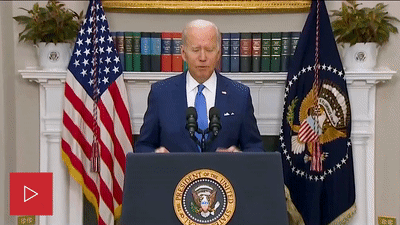Welcome to POLITICO’s West Wing Playbook, your guide to the people and power centers in the Biden administration. With help from Allie Bice. Send tips | Subscribe here | Email Alex | Email Max It’s the speech no one wants to give. But eulogies have become some of the defining speeches of the Biden presidency. Over the course of his first year, the president has made a point of attending the funerals, wakes, and memorials of numerous political power-players of his era. The 79-year old Biden worked closely with former Sens. HARRY REID, BOB DOLE, and JOHN WARNER, former Secretary of State COLIN POWELL and Vice President WALTER MONDALE, whose memorial he will speak at on Sunday in Minnesota. He spoke Wednesday at the ceremony for former Secretary of State MADELEINE ALBRIGHT . Biden may also attend Sen. ORRIN HATCH’s memorial in Utah next week but hasn’t decided, a White House official said. Biden has long taken pride in honoring the dead. As president, however, his eulogies have taken on a new dimension. They are not crafted just as remembrances but also calls to action, said JEFF NUSSBAUM, who recently departed as a White House speechwriter. “As he is extolling the memory of people recently, especially political ones, he's also holding them up as examples of what we can be,” said Nussbaum, the author of the forthcoming book “Undelivered.” “It's now not just a message about the person who's passed away, but also a message to us about what that person's legacy tells us about how we should be behaving today.” Indeed, Biden has woven his recent eulogies with familiar political rhetoric about democracy, autocracy, dignity, the importance of consensus, and the future of the country. “You know, in the battle for the soul of America today, John Warner is a reminder of what we can do when we come together as one nation,” Biden said last June. In December while paying tribute to Dole, Biden said that the longtime Kansas senator had become “deeply concerned about the threat to American democracy, not from foreign nations but from the divisions tearing us apart from within.” For Albright, he placed her story in the context of NATO and autocracies. And he said Reid “knew better than most how difficult democracy is — that the idea of America itself is under attack from dark and deepening forces, that we’re in a battle for the soul of America.” Biden also makes time for more discreet, closed-to-press memorials like the wake of his long-time staffer NORMA LONG last May. In January, he spoke at the service for Gen. RAYMOND ODIERNO, who was the Army commander of Biden’s son, BEAU, in Iraq. In February, he attended the Delaware funeral of the mother of his daughter-in-law even though it was during the opening days of Russia’s invasion of Ukraine. Some politicians have found funerals to be pointless burdens. “I go to funerals. I go to earthquakes,” NELSON ROCKEFELLER complained of his duties as vice president. Biden, however, embraces them with a sense of duty that stems from his own tragedies and is bolstered by his Catholic faith. “I have found over the years that, although it brought back my own vivid memories of sad times, my presence almost always brought some solace to people who have suffered sudden and unexpected loss,” he wrote in his book, “Promise Me, Dad.” “When I talk to people in mourning, they know I speak from experience.” It’s those confrontations with death and Biden’s occupation with helping others confront it that led the Irish journalist and author FINTAN O’TOOLE in January 2020 to describe Biden in the New York Review of Books as “the most gothic figure in American politics. He is haunted by death, not just by the private tragedies his family has endured, but by a larger and more public sense of loss.” Biden deals with his own grief, in part, through faith. He often carries the rosary beads that belonged to Beau, who died from brain cancer in 2015. His church in Wilmington, Del., is also where Beau, Biden’s first wife, NEILIA, and their daughter are buried, allowing him to visit when home, which is often. Biden also attends church more than any president has in decades. Since moving into the White House, he has gone to church services at least 47 times, according to MARK KNOLLER, a longtime White House journalist and de-facto archivist of presidential history. At this point in their presidencies, by comparison:
- DONALD TRUMP had attended church five times
- BARACK OBAMA had attended four times
- And GEORGE W. BUSH had attended 15 times
In fact, Biden has already attended church more than twice as many times as Obama did in eight years (Obama went 22 times, though he sometimes opted against going because of the disruptions that his security detail would cause).
“My religious faith provided some refuge from the pain,” Biden wrote in “Promise Me, Dad,” following Beau’s death. “I’ve always found comfort in the ritual associated with my Catholicism. I find the rosary soothing. It’s almost like my meditation. And mass is a place I go to be by myself, even in the middle of the crowd.” TEXT US — ARE YOU MIKE HARNEY, chief of staff to GINA RAIMONDO? We want to hear from you (we’ll keep you anonymous). Or if you think we missed something in today’s edition, let us know and we may include it tomorrow. Email us at westwingtips@politico.com or text/Signal/Wickr/WhatsApp Alex at 8183240098 or Max at 7143455427.
| 


